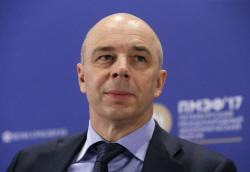|
Russia finance minister
wants better tax collection amid borrowing issues
 Send a link to a friend
Send a link to a friend
 [July 10, 2017]
By Darya Korsunskaya and Andrey Ostroukh [July 10, 2017]
By Darya Korsunskaya and Andrey Ostroukh
MOSCOW (Reuters) - Russia's finance
ministry will focus on squeezing more tax revenue from the domestic
economy as it believes it can not borrow more from foreign investors,
Finance Minister Anton Siluanov said.
Although it aims to bring the budget deficit toward zero in the next few
years, the finance ministry nearly doubled borrowing this year to
compensate for shortfall in incomes from oil exports and a stalled sale
of state stakes in Russia's major companies.
In an interview with Reuters, Siluanov said it would be difficult to
expand its borrowing plan from the 1 trillion rubles ($16.55 billion)
approved for this year.
The finance ministry had enjoyed strong demand for its treasury bonds,
known as OFZs, as foreign investors piled into Russian debt for carry
trades - borrowing dollars cheaply, converting them into the firming
rouble, and then buying high-yielding Russian bonds.
But as the Bank of Russia started cutting rates this year, while the
U.S. Fed increased its own rate, returns from OFZ ownership became less
lucrative, especially after the rouble pared gains and risks of new
western sanctions increased.

Siluanov acknowledged foreign appetite for OFZ bonds had faded recently.
But even if new U.S. sanctions are imposed on Moscow, a "large exodus"
of non-residents from state bonds is unlikely, Siluanov said, as the
OFZs were mainly purchased by major investors and pensions funds that do
not use these instruments for short-term market speculation.
The U.S. Senate voted overwhelmingly in June for new sanctions on Russia
to punish it for alleged meddling in the 2016 U.S. election, an
allegation that Russia dismisses. The new sanctions have not yet been
passed by the House of Representatives, but analysts have expressed
concerns that it could include restrictions on buying OFZs.
While the finance ministry may struggle to sell more OFZs to foreigners,
who owned 30 percent of such bonds in early June, the finance ministry
can not count on domestic money either.
"It would be difficult to rely solely on internal investors without
raising borrowing costs," Siluanov said.
The finance ministry is also struggling to plug holes in the budget by
selling state companies to private investors. Moscow is not willing to
sell such stakes cheaply, blaming Western sanctions for adverse market
conditions.
"If there were no such limitations, sanctions, if companies' valuation were not
clearly underrated, then the privatization would go on more actively," Siluanov
said.
[to top of second column] |

Russian Finance Minister Anton Siluanov attends a session of the St.
Petersburg International Economic Forum (SPIEF), Russia, June 2,
2017. REUTERS/Sergei Karpukhin

"That is why we need a lower budget deficit: no wide-scale privatization is
planned, we won't borrow much on external market, and moreover an extra inflow
of foreign currency could lead to the rouble firming," he said.
A weaker rouble would help the finance ministry, which receives around half of
its budget revenues from selling oil and gas abroad for dollars, to fund social
liabilities ahead of 2018 presidential elections.
TAX COLLECTION
While seeing a need to adjust taxation in the oil-dependent economy, the finance
ministry does not support an idea of tax breaks for oil companies that run
mature oil fields, producing less and less crude, Siluanov said.
Siluanov said tax breaks on most depleted fields may deprive the budget of 130
billion rubles ($2.17 billion) a year.
Rosneft, Russia's influential oil giant, had earlier asked to lift taxes on
Samotlor, a field that was responsible for over a quarter of the Soviet Union's
production but later became depleted with extraction affected by heavy water
levels.
For now, the finance ministry will put an emphasis on better tax collection, as
it does not expect prices for oil, Russia's key exports, to rise above $60 per
barrel in the foreseeable future, Siluanov said.

"We would use all our arsenal to fight against those who evade taxes this and
next year," Siluanov said.
Stronger tax collection and a prudent fiscal policy are tactics designed to
shield Russia from external shocks that in 2014, when Moscow annexed Crimea,
battered the rouble and paved the road for two years of economic recession.
"If we want to secure our liabilities from external factors, we need to be
realistic in assessing macroparameters, including prices for our export goods,"
Siluanov said, referring to uncertainty around the OPEC oil-cut production
agreement and prospects of shale extraction in the United States.
(Writing by Andrey Ostroukh; Editing by Toby Chopra)
[© 2017 Thomson Reuters. All rights
reserved.] Copyright 2017 Reuters. All rights reserved. This material may not be published,
broadcast, rewritten or redistributed. |